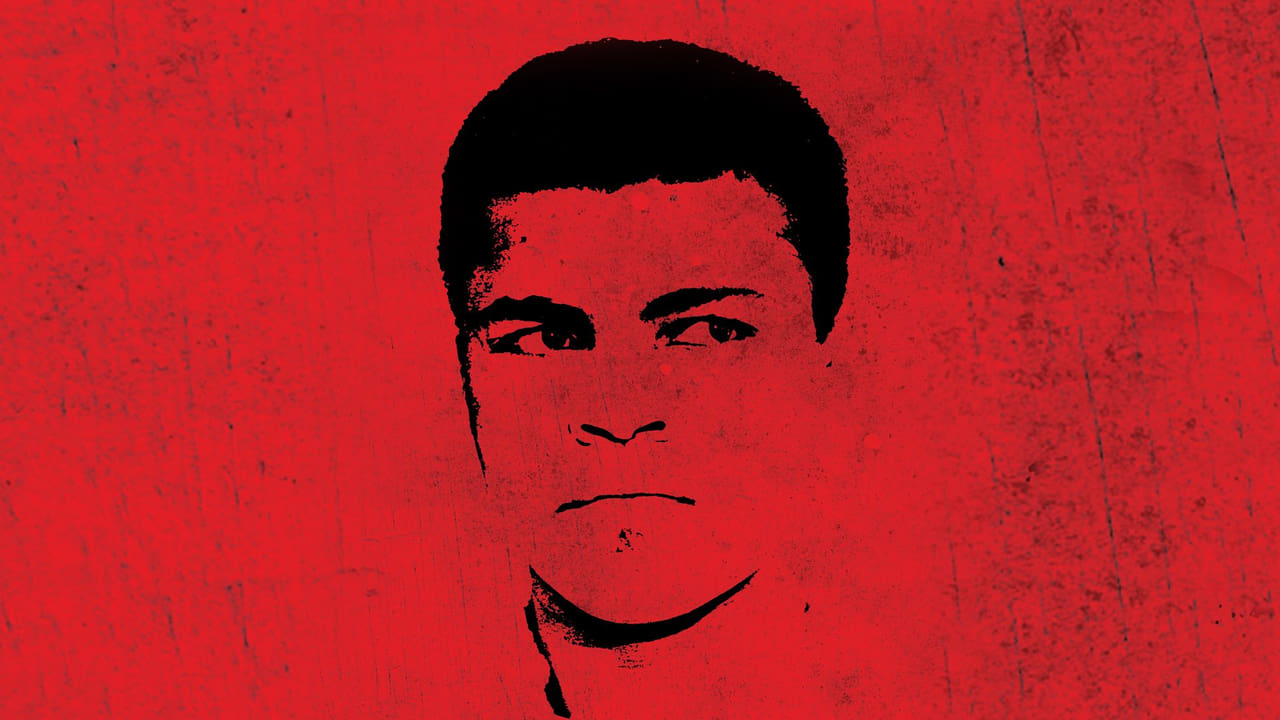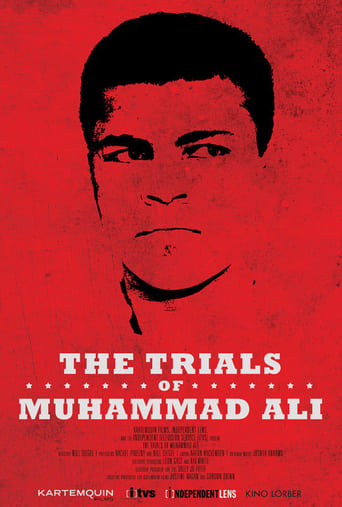NekoHomey
Purely Joyful Movie!
Inclubabu
Plot so thin, it passes unnoticed.
Solidrariol
Am I Missing Something?
Invaderbank
The film creates a perfect balance between action and depth of basic needs, in the midst of an infertile atmosphere.
HealthyLove
Source of the Review : http://www.pbs.org/independentlens/films/trials-of-muhammad-ali/BY Bill Siegel | IN IdentityPremiered April 14, 2014 About the Film The Trials of Muhammad Ali explores the extraordinary and complex life of the legendary athlete outside the boxing ring. From joining the controversial Nation of Islam and changing his name from Cassius Clay to Muhammad Ali, from his refusal to serve in the Vietnam War in the name of protesting racial inequality to his global humanitarian work, Ali remains an inspiring and controversial figure.Focusing on some of the most noteworthy and provocative aspects of the legendary athlete's life, the film explores his lifelong journey of spiritual transformation. From his Louisville roots through his years in exile to receiving the Presidential Medal of Freedom, Ali's path was that of poet to pariah to global ambassador for peace.In 1964, when the 22-year-old Olympic gold medalist won his first heavyweight championship, he shouted, "I shook up the world!" But his earthshaking had only begun. Soon he announced he had become a Muslim with a new name: Muhammad Ali.In 1967, after being denied conscientious objector status, Ali refused military induction. Convicted of draft evasion, he was sentenced to five years in prison and his passport was revoked. Stripped of his title and banned from boxing, Ali faced an American public enraged by his opposition to the Vietnam War and unwilling to accept his conversion to Islam. Vilified in many corners at home, he became an international symbol of opposition to an unjust war.Filing round after round of legal appeals all the way to the Supreme Court, he supported his family via a nationwide speaking tour across a country divided over the war abroad and racism at home. Rare archival footage of Ali's fiery speeches on college campuses and heated exchanges during TV appearances show him fearlessly speaking his mind as he fights for freedom.Archival scenes highlight the forces that supported and opposed him, including his spiritual mentors, Malcolm X and Elijah Muhammad, and critics of his stance, such as Jackie Robinson and Joe Louis. Most of the interviewees have never been featured in any Ali film before, yet are central to his life story and the global impact he had. Interviews shot exclusively for the film include his brother, Rahman; his former wife, Khalilah Camacho-Ali; New York Times writer Robert Lipsyte; and Nation of Islam leader Louis Farrakhan. What emerges is the hidden history and a complex portrait of Muhammad Ali.The Filmmaker Bill Siegel has more than 20 years of experience in documentary filmmaking and education. He co-directed the Academy Award-nominated documentary The Weather Underground; was a researcher on the films Muhammad Ali: The Whole Story and Hoop Dreams; and a writer on One Love, a documentary on the cultural history of basketball by Leon Gast (When We Were Kings). Siegel is Vice President of School Programs for the Great Books Foundation, a non-profit educational organization dedicated to literacy and lifelong learning.
Vicky D. Vijayakumar (Vick41)
Offers great insight into the story of the man, Muhammad Ali aka Cassius Clay. An incredible and outspoken boxer who transcended boxing, and even all of sports. It begins with the journey of a man, the principles he fought for, the trials and tribulations he had to face throughout his life to stand for these principles he believed in, the courage rebellion, and his continuous evolution, reverence and relevance in public folklore, with a popularity that went soaring in the 60s and 70s, and later come to be known as the greatest of all time. Its a genuine tribute to the man, who will not be forgotten, and stands as an inspiration to millions of people, for generations to come.
AfroPixFlix
Marvelous documentary revealing little known aspects of this iconic American's journey. As a teenager, Ali was backed by a coterie of rich, white Kentucky financiers with a keen eye for picking Kentucky Derby winners and one promising prize fighter. Like the rest of the world, they had no idea that Ali (then known as Cassius Clay, named after an abolitionist) would blossom into a veritable goldmine. Yet Ali remained "unbought" throughout his career, refusing to curb his personal convictions for anyone. Arguably, his unblinking allegiance to the Honorable Elijah Muhammad may have been misplaced, but, as the film shows, it was strains of this dogged allegiance to principle that led the Supreme Court to reverse Ali's draft dodger conviction. The film wastes too much time on self-important talking heads (including a family member and Nation of Islam representatives) who appear to overstate their influence on the now stoic Ali. The film also lingers a bit long with Malcolm X's concurrent struggles with the NOI and not long enough with the troubling period when Ali, broke and title-stripped, embarked upon awkward college lecture and way, way off-Broadway tours. It closes with a tearful tribute from his daughter and brother (who bears a striking resemblance to Ali), and a full-circle romp back to the Olympics, from whence his public persona emerged. This isn't a fight film, it's an exonerative victory lap by "The Greatest" that merits eight heavyweight forks from AfroPixFlix.
gregking4
The career of world champion boxer Muhammad Ali has been explored and celebrated in a number of documentaries and two biopics (one of which even starred Ali as himself), but this fascinating and revealing documentary looks at that bleak period of his career when he was stripped of his titles and vilified for refusing to be conscripted into the US army at the height of the Vietnam War. Following his triumphs at the 1964 Olympics and his recent wins to claim the world heavyweight championship Ali converted to Islam, under the influence of Elijah Muhammad, the charismatic but outspoken head of the American Nation of Islam movement. He changed his name from Cassius Clay and became something of an outspoken supporter of Islam himself, denouncing the racism of American culture. His controversial stance as a conscientious objector who refused to enlist and fight in Vietnam on religious grounds made him unpopular. Most people are aware of the basic details of Ali's actions, but few probably know of what happened to him during that five year period. Not only were there trials in the Supreme Court to try and overturn his jail sentence, Ali also faced the court of public opinion as many in America disagreed with his stance. And more lately he faces the more personal struggle as he battles the crippling effects of Parkinson's Disease. Director Bill Siegel (The Weather Underground, etc) draws upon extensive archival footage to put Ali's controversial stance in the larger historical context of the whole Civil Rights movement and the divisive racism of the era. He also uses lots of candid and revealing interviews with the likes of Ali's brother, one of his ex-wives, a veteran sports journalist, and the sole surviving member of his original management group to fill provide some colourful anecdotes and insights into Ali's complex yet charismatic character.

